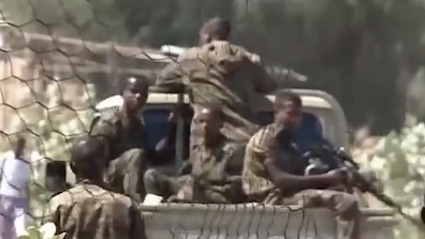Ethiopia and Ethnic Tensions in Amhara
Noriko Watanabe and Lee Jay Walker
Modern Tokyo Times

Ethiopia faces countless internal issues concerning ethnicity, religion, and politics. Accordingly, after an agreement was reached between the Ethiopian government and the Tigray People’s Liberation Front (a conflict involving other ethnic groups, including the Amhara), events would spiral in the region of Amhara – when central forces sought greater power processes.
Voice of America reports (2022), “Ethiopia is experiencing widespread ethnic tensions in several regions, most of them over historical grievances and political tensions. The Amhara people, the second-largest ethnic group among Ethiopia’s more than 110 million people, have been targeted frequently in regions like Oromia.”
Prime Minister Abiy Ahmed of Ethiopia galvanized central Ethiopian forces in 2021 against the threat of the Tigrayan People’s Liberation Front (TPLF) and the Oromo Liberation Army (OLA) when Addis Ababa seemed threatened.
However, given the loyalty of Amhara forces during this crisis – and ethnic massacres committed against the Ahmara by several ethnic groups – wiser heads were needed in Ethiopia concerning power concentration and how to alleviate the fears and marginalization of the Amhara in recent history.
The Wilson Center (Adane Tadesse) reports, “Less than ten months after the November 2022 signing of the Pretoria Agreement that ended the two-year-long Tigray crisis, the second-largest region—the Amhara region—in the country is in turmoil as a result of the outbreak of a military confrontation between the Federal Army and the Fano armed groups since August 2023. As such, there is growing fear that Ethiopia is once again sliding into a protracted civil war. The state of emergency declared in the Amhara region has also further exacerbated insecurity with mass arrests, extrajudicial killings, internet blockages, and disruptions to basic services being the order of the day. As the conflict escalates, several local and international actors (including the United States) have expressed concern and called for peace.”
Relief Web reports, “Political violence has reached new levels of intensity in the northern Ethiopian region of Amhara, making it one of the most unstable areas in the country. After the government announced controversial plans to integrate regional special forces into other security institutions at the beginning of April 2023, the region has seen increasing unrest and frequent clashes between state forces and Fano and Amharic ethnic militias…”
According to the United Nations, at least 183 people were killed in Amhara during the first month of tensions. However, with reporting and internet connections down based on central government restrictions, the fear is that the death toll is much higher.
In one alleged massacre in Majete (Amhara) in early September, over 70 farmers were reportedly killed by central Ethiopian forces. This took place after heavy fighting.
The Guardian reports about one young lady who witnessed her family members being killed.
She says, “They came to our village late afternoon. They asked me and my family where we hide our weapons and threatened us to [make us] hand over the weapons to them… We told them that we are innocent farmers and we don’t have weapons. When they found no weapon after searching the house, they rounded up my two brothers alongside the younger men of our village and shot them all in the head.”
Central government forces under Prime Minister Abiy Ahmed believe they can crush regional dissent through force and then dictate terms on the ground.
This might work in the short-term – while leaving many civilians dead. However, in the long term, it will sow greater regional ethnic and religious discontent. Henceforth, regional grievances and fears need to be addressed politically – rather than ruling regions by fear and ethnic massacres.
https://www.wilsoncenter.org/blog-post/reflection-conflict-amhara-region-ethiopia
https://reliefweb.int/report/ethiopia/fact-sheet-crisis-ethiopias-amhara-region

Modern Tokyo News is part of the Modern Tokyo Times group
http://moderntokyotimes.com Modern Tokyo Times – International News and Japan News
http://sawakoart.com – Sawako Utsumi and Modern Tokyo Times artist
https://moderntokyonews.com Modern Tokyo News – Tokyo News and International News
PLEASE JOIN ON TWITTER
https://twitter.com/MTT_News Modern Tokyo Times
PLEASE JOIN ON FACEBOOK